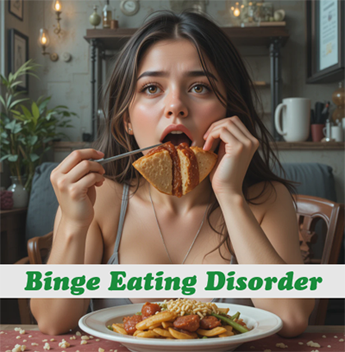Understanding Binge Eating Disorder (BED)
Binge Eating Disorder (BED) is one of the most common eating disorders worldwide and a serious mental health condition. It affects people of all ages, genders, and backgrounds, often causing significant physical and emotional distress.
BED is characterized by repeated episodes of consuming unusually large amounts of food in a short period, typically accompanied by a feeling of losing control.
To fit to the diagnostic guidelines, these binge episodes occur at least once a week for three months or more.
Unlike bulimia nervosa, individuals with BED do not usually attempt to compensate for overeating through purging, excessive exercise, or fasting.

Behavioral Symptoms of Binge Eating Disorder
Recognizing behavioral warning signs is crucial for early intervention. People struggling with BED may experience:
Episodes of uncontrolled, impulsive, or continuous eating
Eating until uncomfortably full and being unable to stop
Eating alone or in secret, often hiding or hoarding food
Sudden or unexplained disappearance of food from the household
Avoidance of conversations about eating habits or body weight
Withdrawing from friends and social gatherings
Spending excessive amounts of money on food, sometimes even resorting to shoplifting
Engaging in risky behaviors such as self-harm, substance use, or suicidal thoughts
Physical Symptoms of Binge Eating Disorder
BED can also manifest through physical health problems, such as:
Fatigue and poor sleep quality
Digestive issues such as bloating, constipation, or food intolerances
Noticeable weight fluctuations (both gain and loss)
Gastrointestinal discomfort
Increased risk of cardiovascular complications
Long-Term Health Effects
If left untreated, BED can lead to severe long-term consequences affecting both the body and mind. These may include:
Cardiovascular disease
Type 2 diabetes
High blood pressure and high cholesterol
Joint pain or arthritis
Social withdrawal, isolation, and loneliness
Clinical depression and anxiety disorders
Treatment for Binge Eating Disorder
The positive news is that binge eating disorder is treatable with the right support. Evidence-based psychological therapies can help individuals regain control of their eating habits and improve overall mental health. The most effective treatments include:
✅ Cognitive Behavioral Therapy – Enhanced (CBT-E): Helps identify and change negative thoughts and behaviors linked to binge eating.
✅ Cognitive Behavioral Therapy – Guided Self-Help (CBT-GSH): Provides structured self-help tools under professional guidance.
✅ Interpersonal Therapy (IPT): Focuses on improving relationships and addressing emotional triggers for binge eating.
Medical Disclaimer :Early diagnosis, professional treatment, and compassionate support play a critical role in recovery. Seeking help from a mental health professional or eating disorder specialist can make a life-changing difference.
Read further on:
≺≺ What eating strategies work best for losing weight long term?
≺≺ What are the top three minerals you can take to boost memory?
≺≺ Why is regular table salt considered unhealthy?
≺≺ What makes Himalayan salt different from regular table salt?
≺≺ How are artificial sweeteners made?
≺≺ How toxic are the nitrites used in curing processed meats?
≺≺ What health problems are linked to consuming corn syrup?
≺≺ What food is most effective for moderating blood sugar?
≺≺ How Do Sugary Meals and Beverages Harm Dental Health?
≺≺ What Is the Ketogenic Diet? Is the Keto Diet Right for Everyone?
≺≺ What is the Okinawan diet? What is the secret behind Okinawan long life expectancy?
≺≺ EWG's- The Clean Fifteen: Fruits and Vegetables with the Lowest Pesticide Levels.
≺≺ What are antioxidants? How antioxidants in the fruits and vegetables help in preventing cancers and diseases?
≺≺ What foods should people with high blood pressure avoid?
≺≺ How can I reduce the risk of cancer-causing chemicals when cooking or grilling meat?
≺≺ What happens to my blood vessels when I gain weight?
≺≺ What type of exercise is best for lowering my blood sugar?
≻≻ Watch this page for more such informative articles on Health, Nutrition, and Wellness.
≻≻-Back to Home page.
Further reading (External Links opens in new window):
≺≺- National Institute of Health - Magnesium.
≺≺- Harvard Health Publishing - What can magnesium do for you and how much do you need?